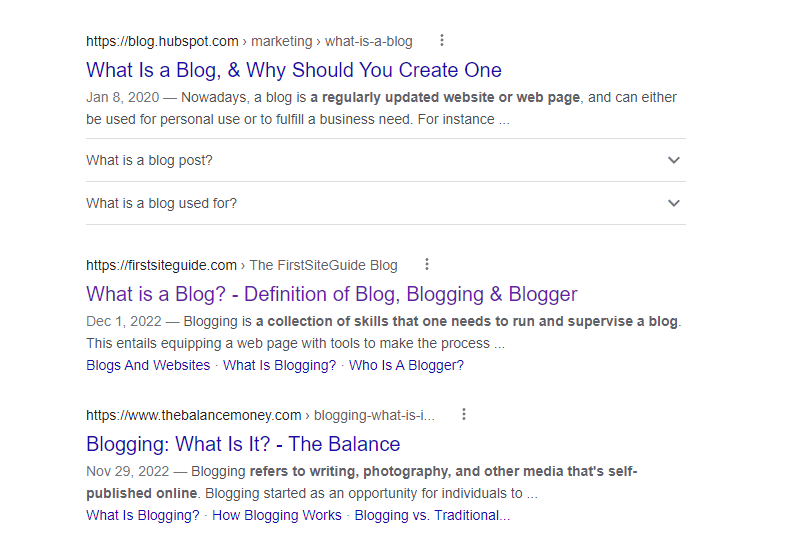What is a website title, and why is it so important for your site?
Website titles are an often overlooked component of excellent content writing. When creating a powerful blog, it’s easy to focus the majority of your attention on filling your page with as much useful information as possible. Unfortunately, even the best blog in the world won’t deliver the desired results if your readers aren’t convinced to click on your page.
Around 68% of online experiences begin with a search engine. When customers type a query into Google, they rely on the titles for each page shown in the search results to determine which pages they should be viewing. If your website title isn’t engaging and interesting, then you’re not going to get clicks, conversions, or sales.
So, how do you create a website title that delivers results?
What is a Website Title? An Introduction
The first step in creating engaging titles is answering the question “What is the title of a website.”
A website title, or “title tag”, is the HTML component that appears in multiple places throughout the internet. It provides both readers and search engines with information about each post or page on your site. The title tag typically appears at the top of an XHTML or HTML document, within the head tag.
In HTML, your title would look like this:
<head>
<Title> Your website title </title>
</head>
On a website browser, this title will appear at the top of the browser tab or window. In search results, it appears as a bold, hyperlinked text. For instance:

Why Do You Need a Website Title?
So why are website titles important? Simply put, they provide both search engines and users with valuable information about what a website page or post contains.
Readers use titles to decide whether the page they’re about to visit is relevant to their needs. Search engines assess website titles as part of an overall SEO strategy, to determine where posts should be placed within the search engine results. For instance, if your customers are looking for the answer to “What is blogging”, they’ll be presented with pages that have these words in the title first:

A poorly worded website title can deter users from clicking on your website, while a strong website title increases your traffic and site potential. Title tags are essential for visibility, and critical for highlighting the context of your piece.
Perhaps most importantly, website titles influence “click-through rates”. Your click-through rate is the number of people who click your link, compared to the number of people who see your link and decide not to click. The more clicks you get, the more your SEO ranking increases. At the same time, more clicks also mean more traffic and opportunities for your blog.
Tips on How to Write Titles
Creating an amazing website title can seem like a complicated process, but it’s actually relatively straightforward. In any situation, your website title should be engaging, relevant, and interesting. Some great ways to improve your title quality include:
- Writing your article first: Writing your article before you actually create the title can be a great way to ensure you include the right information in your tag. At the very least, you should use a blog outline to ensure you know everything you’re going to cover.
- Consider the tone: Think about your target audience and how they’re likely to search for information on the web. What kind of language do they use, and what sort of personality are you trying to convey with your content?
- Keep it short: The shorter the title, the more likely you’ll be able to show all of it in the search results. A good rule of thumb is to ensure your website titles are no more than 50 to 65 characters in length. Otherwise, they may be truncated by search engines.
- Make it relevant: Ensure your article lets your audience and search engines know exactly what your article covers. The last thing you want is for your customers to click on a title, only to be directed to a page without any of the information they need. Misleading titles can harm your search engine authority and increase your “bounce rate”.
Best Practices for Optimising Website Titles
Like most things in the writing and content production world, creating great titles requires a little practice. The more you work on your content creation methods, the more likely you are to comfortably create compelling titles. You’ll also be able to use analytics and reports from your website to determine what kind of titles get the most click-throughs over time.
Here are a few quick tips to get you started.
1. Pay Attention to Punctuation
Most titles don’t necessarily need a lot of punctuation. Since you’re going to be using relatively short headers for your posts, you can usually omit punctuation entirely. However, it can be helpful to use certain pieces of punctuation such as colons and dashes to share information.

If you’re going to include the name of your blog or website in your title, you can separate it from the rest of the post with a dash or a line.
2. Keep it Short
As mentioned above, website titles need to be short, concise, and straight to the point. The longer your title is, the more likely it is to be truncated by search engines. Make sure you put the most important information about your blog at the beginning of the title.
For instance, instead of: “Title strategies and guidelines: What is a website title”, opt for “What is a website title: A complete guide”.
If you can remove stop words and extra unnecessary content from your title tag it’s usually a good idea to do so. Just avoid removing so much content that your title no longer makes sense.
3. Avoid all Caps
When you’re trying to stand out on search engine result pages, it can be tempting to use various methods to grab your audience’s attention. You might want to use unique characters, emojis, and even capital letters in your title. However, this usually doesn’t lead to great results.
Website titles are often viewed as unprofessional and spammy when written in all uppercase letters and using too many unusual characters. Format your title either with sentence case capitalization or using “title case” capitalization, where all of the keywords are capitalized.
4. Place Keywords Naturally
Keywords are crucial to title tags, because they help search engines, and your readers define whether your content has what they’re looking for. Including keywords in your title can increase your ranking potential, but it’s important not to stuff too many words into one sentence.
A good idea is to place the keyword you most want to rank for at the front of your title. For instance, if you’re trying to rank for “How to make money blogging”. These words should be the first the search engines and your customers see.
5. Give Every Page a Unique Title
Every page and post on your website should be unique. This means your page titles need to be unique too. Every title should be optimized to reflect the content found on the core page. Make sure your titles are clear, compelling, and relevant.
Even if a title gets good results, never duplicate it across different pages. This can harm your search engine rankings, because crawlers and search engine robots may struggle to differentiate between pages. Always double-check before publishing a page to make sure you haven’t used a title already.
Making the Most of Website Titles
Now that you know the answer to what a website title is, all you need to do is practice creating the perfect title tags for your own site. Remember, your titles might only be a small piece of your overall content, but they’re crucial to attracting your audience and improving your search rankings.
Make sure your titles are relevant, eye-catching, and straight to the point. Don’t be afraid to experiment with different title styles too, such as questions and number-based titles.
Want to learn another WordPress “secret”? This link will open the gate to hiding page titles.



